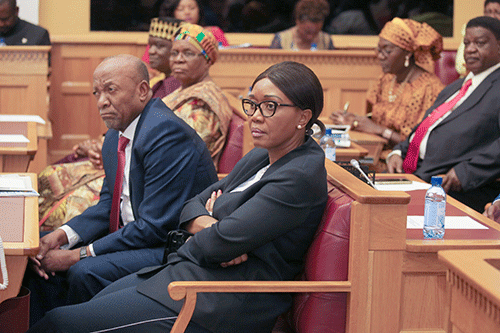Only 26.5% of the world’s parliamentarians are women, placing the world on the back foot in achieving gender parity, but Namibia could achieve its 50/50 target by 2025.
Gender equality minister Doreen Sioka is confident that this is achievable.
“To be frank, I am not satisfied with the general representation of women. But Namibia has made strides, and there is political will [to achieve gender parity], and we will achieve it in the near future,” Sioka said in an interview with New Era recently about women’s representation in legislative chambers the world over.
“Before I leave, I will leave you with a 50/50 legacy,” she added confidently.
Her comments come at a time when it is projected that the world will only achieve gender parity in parliaments in the next 150 years.
Her optimism is further fuelled by the outcome of a recent summit, where female members of Parliament across the political divide converged under one roof in Swakopmund to discuss issues concerning women’s representation.
“Our fellow women in other political parties now do understand the 50/50 concept. After 2024, we will make it. As a country, we are doing well,” she enthused.
Echoing her sentiments was veteran politician Elma Dienda.
“We are doing very well as a country in terms of women’s representation. But President [Hifikepunye] Pohamba failed us because after signing the SADC protocol on 50/50 gender representation, he did not domesticate it so that it becomes law. So, you cannot punish political parties for not adhering to 50/50 if there is no law. Before President Hage Geingob leaves, he must bring that law to Parliament, just like they did with the Local Authorities Act, which requires a list to have 50/50 in terms of men and women,” the Popular Democratic Movement lawmaker said.
She continued: “But we are doing well. You have a Nudo president [Utjiua Muinjangue], Swapo vice president [Netumbo Nandi-Ndaitwah] and the PDM vice president [Jennifer van den Heever], who are all women. I am praying that all political parties will do the same. Overall, we have a lot of female CEOs, women school principals, lawyers, and female judges in the justice system”.
Namibia is faring well in terms of gender parity, with 44.2% female MP representation in the National Assembly (NA), while the National Council is lagging with just 14.2%.
Global situation
At present, no functioning parliament has zero women, “which is a good sign”, while only six countries have achieved gender parity.
This is according to a report on the role of parliament in the implementation of the Convention for the Elimination of all forms of Discrimination Against Women (CEDAW).
The report emanated from a roundtable discussion attended by Namibian members of Parliament (MPs) in Geneva, Switzerland in June.
The indaba was organised by the Inter-Parliamentary Union (IPU) and the Office of the United Nations High Commissioner for Human Rights (OUDHR), in celebration of the 75th anniversary of the Universal Declaration of Human Rights.
MPs Kletus Karondo (National Assembly) as well as Melania Ndjago and Ueutjerevi Ngunaihe, both from the National Council, were present.
The convention touched on the issue of gender parity in global legislative organs of state.
“If one looks at women parliamentarians and women in politics, which by the way is one of the spotlights, only 26.5% of women are in parliament. In just 36 countries, we have a woman head of state or government. There is progress, but it would take 150 years to fully realise equal participation in politics and meaningful participation,” UN high commissioner for human rights Volker Türk says in the report.
“The type of misogyny we see against women in public and political life is mind-boggling, and it’s extremely important that we are vigilant about it, identify why it is happening, and that we try to counter it,” Türk is further quoted as saying.
On his part, IPU secretary general Martin Chungon said: “Gains in women’s rights and gender equality are at a serious risk of being reversed by multiple crises”.
“We need more women in high-level positions so that they have this vision of gender equality, and have more sensibility. I think the big challenge for a woman is to raise her hand, believe in herself and say, yes, I want to be there. Trust women, and give them a chance to participate by creating quotas. To achieve gender equality in parliament is to have equal representation, to have the same opportunities and the same rights,” Cyntia Lopez Castro, Mexican MP and IPU Forum of Women Parliamentarians member says in the report.
Challenges
The report furthermore sheds light on a myriad of challenges faced by female MPs and women in politics in general.
“Gender-based violence (GBV) at home and in the public sphere and even in political life is a global phenomenon that constitutes a key barrier to women’s political participation. GBV in politics targets women more than men, e.g., sexist threats, sexual harassment, online harassment and female political candidates and journalists are exposed to online GBV,” the report said.
There are also deeper-rooted gender stereotypes defining the roles of men and women, often associated with women being excluded from rooms where strategic decisions are made.
“The assumption that women are weaker is not true, and the need for women to look towards men’s protection and guidance continues to hinder women’s participation in decision-making,” the conference confirmed.
Sexual harassment is another worrisome harbinger, keeping women at the periphery of global politics.
According to statistics, one in three women worldwide faces sexual harassment in their lifetime, a worrisome concern, especially when it comes to women in the political arena.
“Surprisingly, male colleagues are mostly perpetrators in harassing those women. This harassment takes place inside parliament as well, when women are in their constituencies, and in their private lives,” it stated further.
– emumbuu@nepc.com.na



